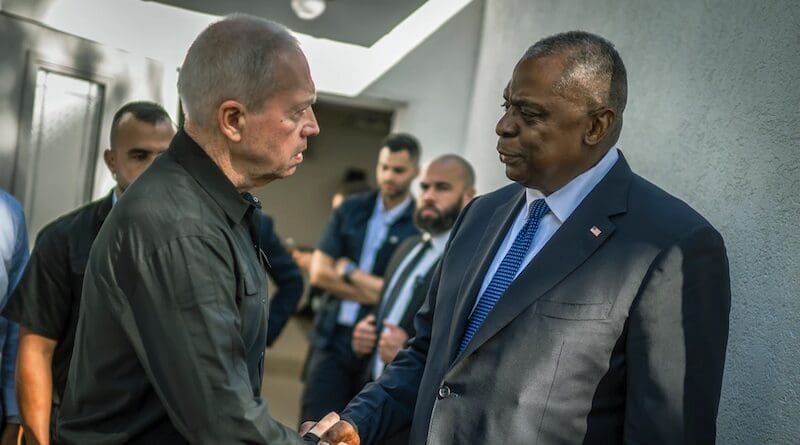Pentagon Spokesman Details US, Israel Meeting, Danger From Islamic State
By DoD News
By Jim Garamone
Secretary of Defense Lloyd J. Austin III will meet with Israeli Defense Minister Yoav Gallant Tuesday at the Pentagon to discuss a range of issues, including the release of the hostages Hamas has taken, Israeli operations to defeat Hamas in Gaza and the need to ensure the safety of the more than 1 million people sheltering in Rafah, Pentagon Press Secretary Air Force Maj. Gen. Pat Ryder said Monday.
Although the meeting with Gallant was previously planned, it has higher interest due to the situation on the ground in Gaza. After Hamas launched the Oct. 7, 2023, attack on Israel that killed more than 1,200 people, the terrorists took hostages. While some were released and others were liberated, Hamas still holds around 130 hostages, including some Americans, according to Israeli officials.
Austin and Gallant will discuss Israeli operations in Rafah. United Nations officials said more than 1 million displaced people are in the city.
White House officials have said that a ground invasion of Rafah without a credible plan is a mistake, given the large number of displaced people. U.S. officials have been discussing with the Israelis the “ways to go about addressing the threat of Hamas, while also taking into account civilian safety,” Ryder said. “A lot of those are from our own lessons [learned] conducting operations in urban environments. I would expect the conversations to cover those kinds of things.”
That Israel has the right to defend itself against Hamas is not at issue, Ryder said. “The secretary still believes fundamentally in Israel’s inherent right to defend themselves and that we will continue to support them in that regard, and that support is ironclad.”
Ryder said the U.S. effort to build a pier to get supplies into Gaza is on track. Army and Navy assets are traveling to the Eastern Mediterranean now. “[U.S. Central Command] is continuing to work through the logistics piece,” Ryder said. “I don’t want to get into specifics, but [we’re] making progress in terms of the onshore security, as well as making some progress as it relates to the concept of operations in terms of how aid will be loaded and then taken off the — off the pier into Gaza for distribution.”
Ryder also answered questions about the Islamic State attack in Russia during a press gaggle. The Islamic State attack Saturday at the Crocus City Hall in Moscow killed more than 130 people and injured more than 180. Ryder said the attack highlights that ISIS is still a threat. U.S. officials passed intelligence to Russia about an imminent terror threat in early March, he said.
The Islamic State issued a statement taking credit for the Moscow terror attack.
The United States continues to work with allies and partners to stay on top of the terrorist threats around the world. One example is the U.S.-led Defeat ISIS coalition in the Middle East. “What you saw after the counter-ISIS campaign in Iraq and Syria was some of the elements of that group moved to other parts of the world,” Ryder said.
Most notably, the group moved to Afghanistan and formed ISIS-Khorasan and moved to areas in Africa. “It is definitely something that we continue to monitor from a counterterrorism standpoint; counterterrorism is part of the National Defense Strategy,” Ryder said. “It’s something that we just have to keep after and not underestimate their ability to conduct these kinds of attacks.”
Ryder noted that even with relations between the United States and Russia being tense because of President Vladimir Putin’s unprovoked invasion of Ukraine, the United States shared intelligence with Moscow about the possibility of a terror attack. “You heard the White House say over the weekend that we had notified Moscow in advance … about a planned terrorist attack in Moscow and had also issued an advisory to Americans to avoid going to any public places,” he said.
This comes under a “duty to warn” policy that the United States follows, the general said. If the United States learns of an attack like this, there is a “duty to warn, particularly something that could harm civilians,” he said. “Either law enforcement or intelligence services would reach out through the appropriate channels to make sure that information is passed.”

